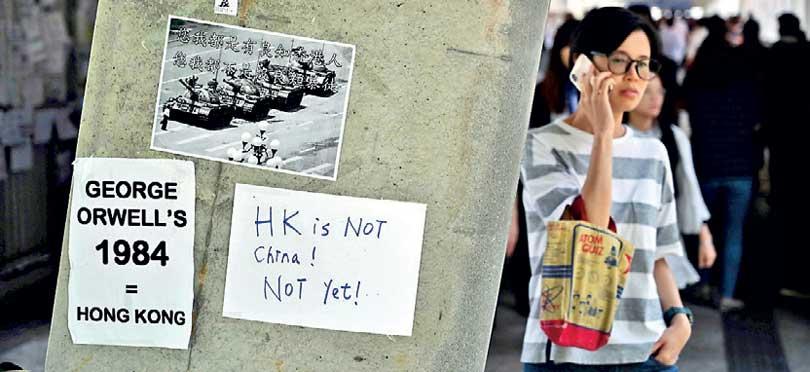15 Jun 2019 - {{hitsCtrl.values.hits}}

People walk past placards against a controversial extradition law proposal pasted on a wall near the Legislative Council Complex in Hong Kong
HONG KONG (AFP) - Top executives in Hong Kong have warned they will have “no reason to stay” if the city’s freedoms are damaged by a proposed bill allowing extradition to mainland China.
In a trend that could be damning for the international finance hub, some businesses say they would consider moving if the controversial bill which has provoked a huge backlash in the city is passed.
“Hong Kong is a jewel,” the French boss of an investment company told AFP on the condition of anonymity, “where we do not fear being
bothered by police.”
But that could be about to change, with the proposed extradition law applying not only to Hong Kong citizens but also to foreigners living in the semi-autonomous territory or even people in transit at the international airport.
Hong Kong’s “real strength comes from the application of the law, from the rule of law. You do not go to prison for no reason. No one will close your business without reason and without you being able to defend yourself in court,” added the investment boss.
The territory, which operates under a “one country, two systems” model where Hong Kong keeps freedom of speech and assembly rights unseen on the mainland, flourished at the end of the 20th century as a global financial centre and a gateway to its giant neighbour now the second largest economy in the world.
But an increasingly assertive Beijing is extending ever more control over the city, chipping away at its semi-autonomous status. Protests over the controversial bill led this week to the worst political violence since before the former British colony’s handover to China in 1997.
With its sky-high rents and tiny living spaces Hong Kong has long been under pressure from its regional rival Singapore for the title of Asia’s business capital.
But “the credibility of Hong Kong is now on the line,” Tara Joseph, president of the American Chamber of Commerce Tara Joseph told CNBC, especially given the acrimonious trade war with Beijing.
Outside the city, there has been disquiet over the bill.
Washington has warned the law could “damage Hong Kong’s business environment and subject our citizens residing in or visiting Hong Kong to China’s capricious judicial system”.
The European Union also expressed concerns the law could have “potentially far reaching consequences for Hong Kong and its people, for EU and foreign citizens, as well as for business confidence in Hong Kong.”
Opponents of the law fear opaque justice and heavily politicised courts on the mainland.
Many have in mind China’s detention of two Canadians in the wake of the arrest in Vancouver of a top official from the Chinese telecoms giant Huawei. In Hong Kong the disappearance of booksellers who published salacious books on China’s leaders, and who later turned up in Chinese custody, has also not been forgotten.
“I came to live in Hong Kong because I didn’t want to live in China,” a foreign architect told AFP.
“If Hong Kong becomes just a Chinese city like any other, I’ll have no reason to stay.”
“It’s a matter of principle,” said the architect. The possibility “to extradite with no safeguards for a fair trial will open a Pandora’s box.” - ‘Prefer Seoul, Singapore and Tokyo’ -
“At that point Hong Kong is just really a part of China,” an American partner at an asset management company told AFP. “People might still be fine to come for three years, five years, but are you going to really put down roots here if you have real or implied political risk? I think probably not,” she added.
According to the authorities, the law aims to fill a legal loophole and stop the city becoming a refuge for criminals.
Faced with pushback from business interests, including from pro-Beijing lawmakers who fear the impact of the law on the city’s appeal, the Hong Kong government introduced a series of safeguards and removed a series of economic crimes from the original list of extraditable offences.
But it was not enough to quell fears.
Bankers and accountants are afraid of being sued for complicity in fraud committed by their clients in a country where “penalties for financial fraud are severe”, Victor CK Wai, a banker and retired accountant, told the South China Morning Post.
According to the French businessman, the law will particularly ring alarm bells for big multinationals -- especially US companies -- and companies working in sensitive fields like armaments or IT. “We can imagine that they will rather want to not be based in Hong Kong to avoid harassment” and they will prefer Seoul, Singapore or Tokyo, he said.
15 Nov 2024 15 minute ago
15 Nov 2024 21 minute ago
15 Nov 2024 33 minute ago
15 Nov 2024 57 minute ago
15 Nov 2024 1 hours ago